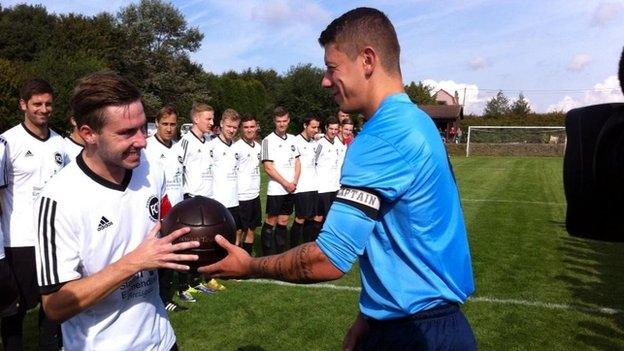WW1 Christmas truce letter found in Staffordshire
- Published
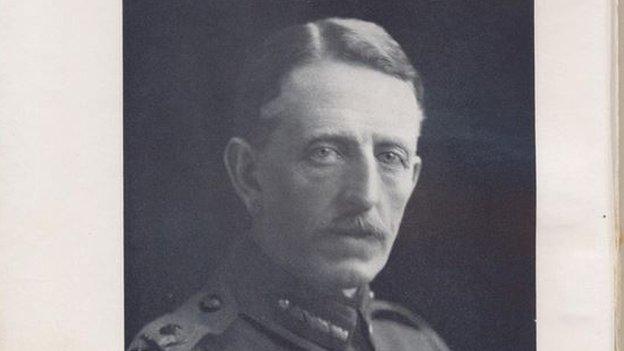
Gen Walter Congreve wrote the letter to his wife on Christmas Day 1914
Soldiers sharing cigars, singing songs and walking together in no-man's-land on Christmas Day 1914 are some of the scenes described in a letter uncovered in a council's archives.
The letter was written by a general who was based in Northern France during World War One.
It was given to Staffordshire County Council by the general's family in the 1960s but was only unearthed, among hundreds of other documents, this year.
It will now go on public display.
'Cigars and songs'
The letter, written by General Walter Congreve to his wife on Christmas Day, details how the famous truce came about.
Gen Congreve, who led the Rifles Brigade and was positioned at British Headquarters near Neuve Chapelle, says it was the Germans who initiated the suspension in hostilities.
He describes the ceasefire as "an extraordinary state of affairs".
"A German shouted out that they wanted a day's truce and would one come out if he did," the general wrote.
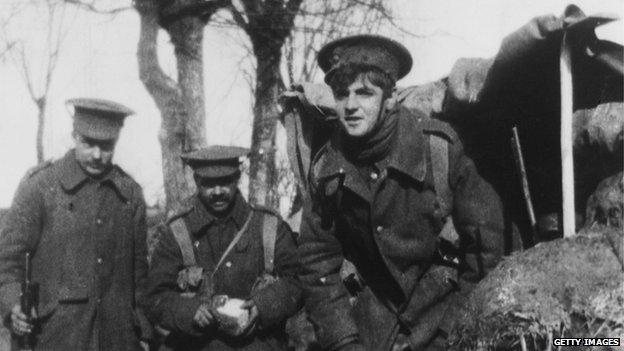
Troops are described as "giving each other cigars and singing songs"
"Very cautiously one of our men lifted himself above the parapet & saw a German doing the same.
"Both got out, then more... they have been walking about together all day giving each other cigars & singing songs."
However, the general said he himself had not joined the truce in case the Germans could not resist taking a shot at such a high-ranking officer.
He also writes he has heard of battalions "further north" playing football - a reference to the famous WW1 football match.

The Christmas Day letter
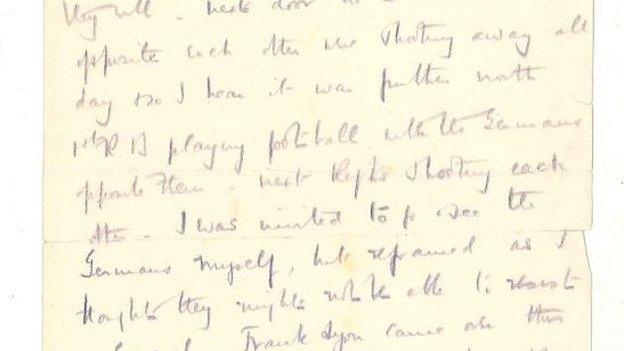
The letter says the ceasefire was an "extraordinary state of affairs"
Darling dear - as I cannot be with you all, the next best thing is to write to you.
We have had a "seasonable weather" day - which means sharp frost & fog & never a smich [sic] of sun. I went to church with 2 of my battalions in an enormous factory room & after lunch took down to the N. Staffords in my old trenches at Rue du Bois Mother's gifts of toffee, sweets, cigarettes, pencils, handkerchiefs & writing paper.
There I found an extraordinary state of affairs - this a.m. a German shouted out that they wanted a day's truce & would one come out if he did; so very cautiously one of our men lifted himself above the parapet & saw a German doing the same.
Both got out then more & finally all day long in that particular place they have been walking about together all day giving each other cigars & singing songs. Officers as well as men were out & the German Colonel himself was talking to one of our Captains.
My informant, one of the men, said he had had a fine day / of it & had "smoked a cigar with the best shot in the German army, then not more than 18. They say he's killed more of our men than any other 12 together but I know now where he shoots from & I hope we down him tomorrow".
I hope devoutly they will - next door the 2 battalions opposite each other were shooting away all day & so I hear it was further north, 1st R.B. playing football with the Germans opposite them - next Regiments shooting each other.
I was invited to go & see the Germans myself but refrained as I thought they might not be able to resist a General.

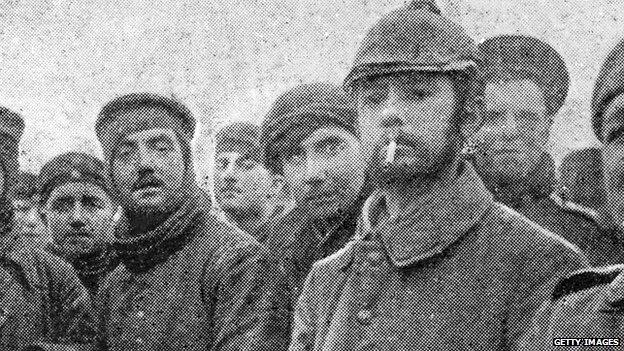
The Christmas Day truce passed into legend but historians say letters describing the event are "comparatively" few
"To have such a detailed account from a high ranking officer, written on the actual day, is a real gem," said Ben Adams, the councillor responsible for archives.
"The fact the letter has come to light in the year we commemorate the centenary of the Great War makes its existence even more special."
The letter was part of a family archive that stretched back to medieval times. It was originally deposited with the council by a member of the general's family in the 1960s.
However, it was only this year, when the council began trawling its material for WW1 centenary material, that it discovered the letter.
"One of our volunteers transcribed it," said Joanna Terry, head of archives and heritage.
"The level of detail it goes into is very exciting. It wasn't something we expected to find and we feel very privileged it was placed in our care."
The council plans to display the letter until Christmas, either in the National Memorial Arboretum in Alrewas or at its record office in Stafford.
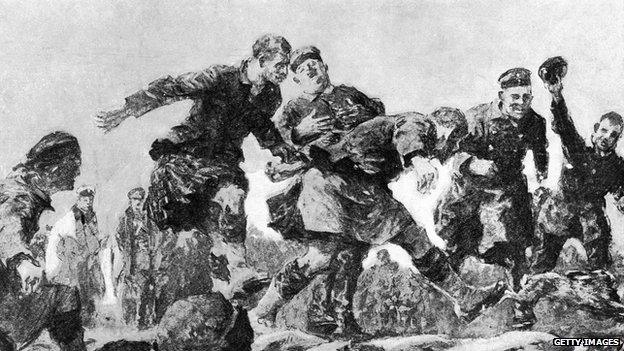
The Imperial War Museum says the letter is "a particularly interesting addition" to accounts and depictions of the truce
Anthony Richards, from the Imperial War Museum, said there were "various accounts" of the Christmas truce story and described the letter as "a particularly interesting addition".
"A nice feature of the letter is Congreve's reluctance to witness the Truce for himself, fearing the temptation for the enemy to have a shot at him," he said.
Joss Musgrove Knibb, from the Staffordshire Regiment Museum, said: "This letter adds to the comparatively small but incredibly important national cache of letters written during the days of the Christmas truce.
"It is a treasure, made all the more remarkable that it has only come to light a century after the events it describes."

• Gen Congreve's parents were from Castle Church, in Stafford. He was born in 1862 in Chatham, Kent and he died in 1927.
• At the start of WW1 Gen Congreve was commanding 18 Infantry Brigade at Lichfield in Staffordshire. In 1915, he was promoted to command 6th Division and assumed command of 13 Corps. In June 1917, he lost his left hand.
• Gen Congreve won the Victoria Cross during the Second Boer War. His son Billy also won the honour, making them the only instance of a father and son in the same regiment to be awarded the British Army's highest military honour.
- Published24 August 2014
